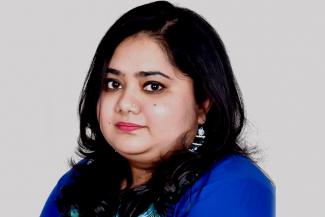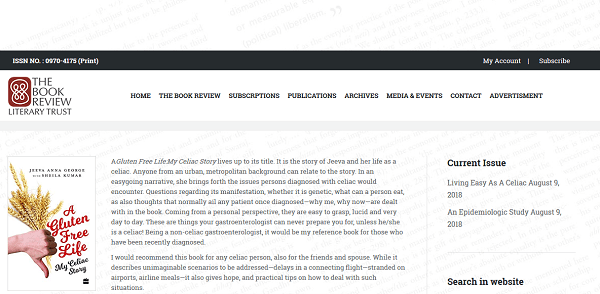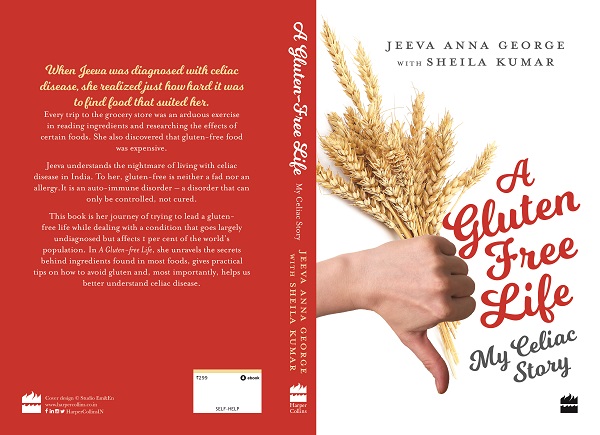
When Jeeva Anna George was diagnosed with Celiac disease, an uncommon digestive disorder causing inflammation of the small intestine, her whole life began revolving around food. Here she talks at length about her personal journey and how she learnt the hard way to control the disease by strictly following a gluten free diet.
At what age did you discover you had celiac disease?
My symptoms started when I was 25 but I was diagnosed a month after turning 27.
What were your initial symptoms?
My initial symptoms were quite a few. I used to feel itchy but I attributed it to Bengaluru weather/seasonal changes, never associated it with food. I lost a lot of weight, used to have joint pain so much so that once I thought I had dengue or chikungunya. I experienced a few episodes of brain fogs and it affected my concentration. My hair was falling, so I constantly kept checking for thyroid but the tests came out normal. The biggest symptom of course was inexplicable diarrhoea. There was no pain or any such thing, I just felt tired. Numerous symptoms which mimicked different ailments and, at one point, I attributed it to stress as well. Thankfully the constant diarrhoea was a symptom as I knew it required consulting a gastroenterologist, because with celiac disease symptoms vary from person to person.
Did you know anybody who had celiac disease? Anybody in the family?
No, I knew nothing about the condition until I heard it from the doctor. It was completely new to me, I had never heard of it before though I’d heard about many other conditions like Crohn’s and Hashimotos thyroiditis. No, no one in my family had it either.
People with celiac disease are prone to getting other disorders like thyroid, diabetes, arthritis, and osteoporosis. Do you have any other health issues that could be attributed to celiac disease?
For now I suffer from positional vertigo. Doctors don’t actually think there is a connection but I am convinced whenever I eat gluten accidentally it stirs up my vertigo. All the conditions mentioned above exist in my immediate and extended family.
What kind of specialists do you consult and how often?
I do a general check-up yearly and more often than not visit a gastroenterologist and ENT specialist. I would like to add for a person who suffers from Celiac Disease its best to get their tTG levels tested every year or even every 6 months initially. This test is important because if the levels are within the specified range one knows the person is on a proper gluten free diet and if the levels are high it indicates the person has accidentally been eating gluten or been cheating and not adhering to the diet.
A gluten free diet because of celiac disease is a daily challenge. Could you run us through your meal plans for the day?
Yes, it is a daily challenge but over the years I have learnt how to deal with it.
My day always starts with a glass of water preferably lukewarm but never cold. I have seen it aids digestion and does wonders for my gut.
Breakfast
My most important meal of the day and something I look forward to. On an average of 3 days in a week it’s a mix of dosas or idlis and some days millet dosas as well with sambar and different types of chutneys. I rotate between coconut, coriander and tomato chutney. On other days of the week I usually whip up buckwheat or finger millet pancakes or make traditional Keralite breakfast dishes like appam and stew, puttu and kadala (brown chickpea) curry.
On days when I am in a hurry I eat a fruit like banana and have some gluten free cereal with lactose free milk. I am partially lactose intolerant as well so I prefer to stick to lactose free milk.
I have a cup of tea after my breakfast.
If I feel like snacking before lunch I stick to munching on a few walnuts and almonds or eating a fruit like an apple or banana.
Lunch
It’s usually rice (white/brown/red rice) with dal, two different veggies, salad and at times some chicken or tomato/peanut rice and on some days a pulao loaded with vegetables. On one or two days of the week I use millets or quinoa instead of rice. I prefer to stick to a vegetarian lunch throughout the weekdays.
Evening
I love drinking tea but over the past few years I have given up the habit of drinking tea because I found I sleep better if I don’t drink tea and I reserve that evening cup of tea as a treat for the weekends. If I am feeling hungry I snack on baked sweet potato chips or rice crackers or carrot sticks with hummus. I grew up in Kuwait so I am very fond of falafel and anything to do with hummus.
Dinner
Now this is one meal which keeps changing every day. On busy days it is gluten free chapattis and one or two accompaniments or even the leftover rice from lunch. On other days it varies from gluten free pasta either in pesto or arrabiata sauce, on weekends sometimes a baked dish with vegetables and cheese or pizza and on some days some chicken and lot of vegetables.
I tend to eat fruit before my meals because it fills me up and I eat less rice or carbs. Of course there are days when I cannot stick to this routine but more or less on an ordinary day my meals comprise of what I have mentioned above.
I tend to do a lot of preparation during the weekend so I find it easier fixing meals during the week.
What lifestyle modifications have you made to overcome celiac disease?
A lot! I never travel or commute without food in my bag. Planning and reading labels have become second nature to me. I try to maintain a routine and for me a good night’s sleep is very important or I am not myself the next day. I do not stick around at social functions or events post a certain time because I know if I don’t get my sleep it’s me who will suffer. I am careful of what and where I eat from. It’s a lifestyle of being alert and now I am used to it.
You are the co-author of ‘A Gluten Free Life - My Celiac Story’. Give us two reasons why your book is essential read for all?
Written in a chatty style ‘A Gluten Free Life My Celiac Story’ is a jargon free informative book but also has everything from recipes to hilarious anecdotes, it weaves in life lessons as well and offers encouragement for all. It is the first book ever to be published in India from a celiac disease sufferer’s perspective.
Which are your 3 favourite gluten-free food items?
- My own banana bread loaf
- Finger millet (ragi) pancakes
- Rice lime and coconut cake.
You are also a special diets baker and consultant? What does your special diet entail?
Yes, I am. I bake for people with different dietary requirements. Everything I bake is gluten free so apart from it being gluten free I bake for kids/people on a gluten free casein free (GFCF) diet especially those who are autistic. There are many who have to follow different diets due to allergies. Some of my bakes are gluten, nut, dairy, egg and soy free. There are also requests for refined sugar free products and even paleo and keto friendly products. Although I do take in lot of requests at the moment I am moving away from this and focussing on making products which can fit most people’s special needs and also making it last longer to help me mass produce my baked goods. I work with institutions from time to time as a consultant when they require my guidance for helping with CD (Crohn's disease) patients or various special diets.
What happens if someday you don’t adhere to your diet?
The first immediate symptom is a bad stomach, pain along with bouts of diarrhoea. It also makes me tired, I succumb to headaches and at times itching. It is usually a few days of being bloated and uncomfortable. Sometimes if I am glutened and haven’t had enough rest then my vertigo slowly shows up as well.
What has been the hardest part of your journey?
Today, when I look back it was those initial years when I was clueless, newly diagnosed and had to give up my former life. I never imagined I would give up a 9 to 5 job and completely switch my profession of being an Economist to work in the food industry. I didn’t know how to cook or bake till I was diagnosed but it’s been a rewarding and at times hard journey but definitely which has made me look at life differently and I must add positively.
Do you consult a nutrition specialist to avoid nutritional deficiencies?
I have in the past and they have given me some multivitamins or when I do my check-up. The GP prescribes multivitamins in case my tests show a lack of anything.
What 5 tips would you give to live better with celiac disease?
As a person who suffers from Celiac Disease, I make sure there a couple of things I always do:
- Read Labels - The numerous times I have found hidden sources of gluten are just too many to cite but till date, I would say my greatest discovery is finding that Compounded Asafoetida in powdered form, contains wheat. Even if I know a product is gluten free, I still read the label because you never know, sometimes the manufacturer changes an ingredient or claims something is gluten free when actually it is not. The main reason I insist upon this is because even though the FSSAI introduced labelling regulations in 2016, there is a lamentable lack of enforcement.
- Plan, plan and plan - I make sure I plan my meals, this includes if I am commuting for a long time during the day, if I am travelling, if I am visiting a restaurant, if I am attending a conference. I say this because I have learnt the hard way; trust me you don’t want to go hungry for hours together. Foods you can carry are nuts, energy bars, packed gluten free sandwiches, fruit and now you also have ready- to- heat- and-eat chapati. I make use of technology: I always check the menus of restaurants I am visiting online. When in doubt I always speak to the waiter, manager or chef. I sometimes eat before I go for an event because I know there is a possibility that I won’t be able to eat anything offered. Also, if I am taking an international flight, I book gluten free meals 24 hours prior to my journey or better still when I`m booking my ticket.
- Maintain a Food Diary – It’s helped me discover what suits my gut. I discovered I am slightly lactose-intolerant and coffee doesn’t suit me. I also realised I have to stay away from consuming excess of dal and vegetables like lady’s finger, spinach and brinjal.
- Medical Tests – Get yourself checked at least annually! This way you know if your vital stats are ok, if you are adhering to a gluten free diet and if there is anything health issue you need to take care of.
- Pick your battles, keep stress at bay – Stress triggers and aggravates autoimmune disease symptoms. As far as possible I try to keep stress at bay. To you, I say: whatever may be the cause of your stress, try to deal with it when you are feeling healthy or when you are prepared to tackle it.








